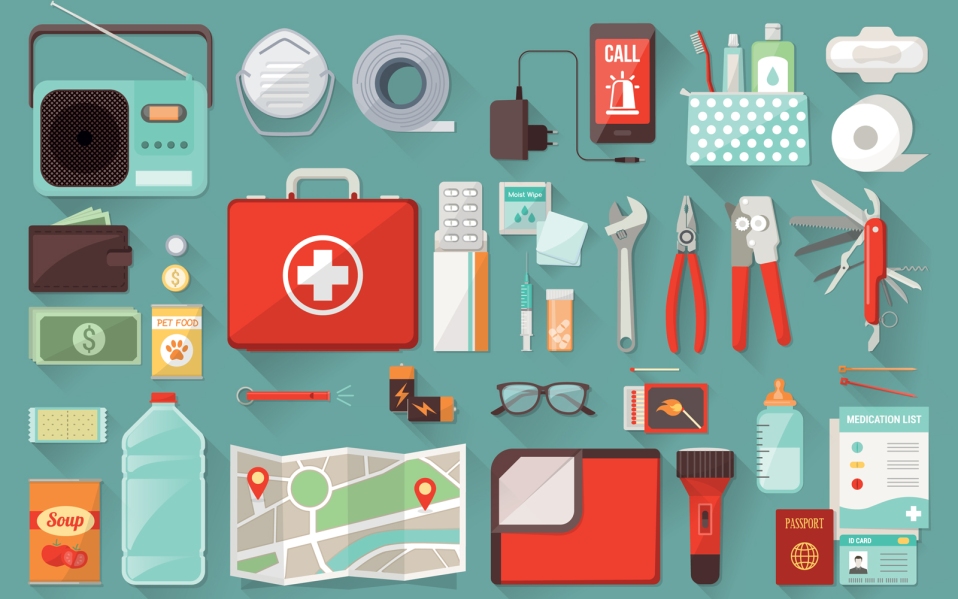You are here
Home › QVHD Emergency PreparednessQVHD Emergency Preparedness
Helping You Prepare...
QVHD’s Public Health Emergency Preparedness (PHEP) Program plans for and responds to emergencies in Bethany, Hamden, North Haven and Woodbridge. Emergencies include natural disasters, an act of terrorism, disease outbreak and more. QVHD is committed to monitoring the availability of public health services, communicating updates and instructions for providing assistance to the town in their emergency shelters.

Start Preparing Today!
The unexpected can happen at any time without any warning. Being prepared is the best way to keep you and your loved ones safe and healthy during an emergency.
5 Types of Emergenices
1. Severe Weather: Blizzard, Hurricane, Severe Heat 2. Natural Disasters: Earthquake, Tornado, Tsunami. 3. Disease Outbreak: Ebola, Enterovirus. 4. Bioterrorism: Anthrax, Clostridium Botulism. 5. Chemical Exposure: Cyanide, DDT, HydroChloride.1. Build a Kit - Gather Emergency Supplies for your home, your car AND your workplace
- Prepare Your Car for an Emergency
2. Make a Plan - Develop a Family Disaster Plan
- Create Your Family Emergency Communication Plan PDF
3. Be Informed - Know what disasters can affect your area and what to do before, during and after an emergency
Where Do I Go?
- Evacuation Routes- List of Major Routes throughout the State of Connecticut.
- Emergency Shelters- List of Emergency Shelters for Bethany, Hamden, North Haven, Orange and Woodbridge.
- Returning Home- Know when it's safe to return home after a diaster.
What About Them?
Emergencies can happen at any moment causing excessive stress for families. Learn how to prepare indivudals and animals with special needs prior to an emergency.
- Elderly: Monitor Medications - many people depend on daily medications, plan ahead by following these tips
- Disabled: Access to Mobility
- Children: Ensure Safety
- Pets: Pet Friendly Information
Helping Home Health Agencies Prepare...
The Quinnipiack Valley Health District (QVHD) developed a Preparedness Program to prep home health agencies and their clients on safety and response measures before an emergency occurs.
Our materials are designed to offer support, decrease stress and provide guidance to clients on how to recognize their unique individual needs and address any gaps in their current preparedness status. Collaborating with home health workers who have already fostered relationships with their clients, widens the span of their work to assure that the needs, supplies and contacts unique to the client will be prepped prior to any threat.
-
Personal Preparedness Plan to be completed by all clients and their caregivers’ to ensure all essential information is in one, easy to grab and go location
-
Emergency Supply List Having an emergency supply kit is essential for every household. Most items are inexpensive and easy to gather!
-
Medication List will help agencies and their clients avoid confusion by keeping track of everything that keeps them healthy in an organized manner. This list helps clients remember what medication they take, when/how often they take it, dosage, when they began taking it, why they take it & who it was prescribed by.
-
Pet Preparedness - Pets are family, make sure you have the essentials in your emergency supply list for your furry friend too!
-
Safety for Older Consumers this guide is benefical for staff to review with their clients as it highlights important safety measures to keep in mind for each room throughout their home.
-
QVHD's Guide on Safe Storage and Disposal: Overprepared? Many people rely on regular medications that change over time and can result in an overflowing medicine cabinet. To avoid medication mismanagement or accidental poisioning regularly dipose of any leftover, unneeded or expired prescription medications.
Some may find it particularly stressful to prepare for such a large range of potential emergencies, check out Ready.gov's quick guides and increase your confidence on what you can do before, during & after various events.
Fall & Winter Weather Safety Tips | Summer Weather Safety Tips | Spring Weather Safety Tips | Winter Storm Guide | Thunderstorm Guide | Hurricane Guide | Earthquake Guide | Extreme Heat Guide | Flood Guide | Home Fire Guide | Power Outage Guide| Tornado Guide
Quinnipiack Valley Health District's Push Partner Program
Push partners are organizations that are willing to partner with local health in the event of a large-scale public health emergency requiring medical countermeasures.
Registering as a QVHD Push Partner would allow your facility to provide life-saving medication, provided by the national stockpile through QVHD, to your clients, employees and employee family members (if so desired). Adopting the push program will eliminate the challenge of having to transport each of your clients to the community-wide Point of Dispensing (POD).
Unfamiliar with POD programs? Watch this video provided by Catawba County North Carolina for an overview on why and how POD's function.
To become a QVHD Push Partner please review the following agreement and fax the completed form back to QVHD at your earliest convenience.
Agreement for QVHD Push Program Fax Number: (203)-248-6671
QVHD Medical Reserve Corps (QVHDMRC)
-
Are you interested in volunteering during a public health emergency? The Medical Reserve Corps offers opportunities for both medical and non-medical volunteers to serve during emergencies at points of dispensing, shelters and community events. MORE

